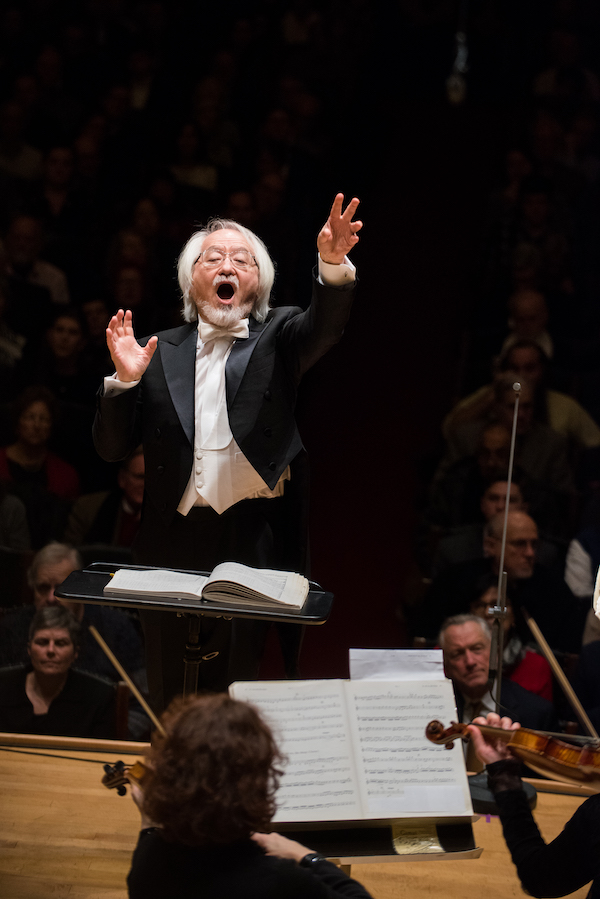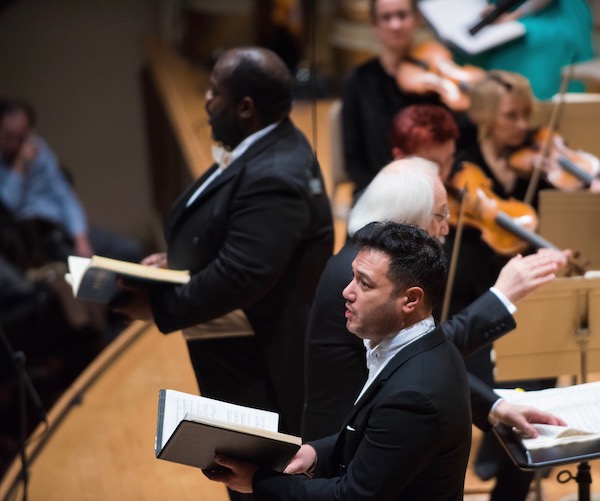Soloists, chorus make for a captivating “Messiah” from Handel and Haydn Society

For the religiously minded listener, Handel’s Messiah remains a timeless expression of deep faith and spirituality. Yet when performed with vocal distinction and conviction, the oratorio’s tale of sacrifice and redemption can be as captivating as any operatic narrative even for skeptics.
Such was the experience in Symphony Hall on Saturday afternoon, when the Handel and Haydn Society, led by guest conductor Masaaki Suzuki, delivered a performance of the Messiah that revealed a sense of both drama and reverence.
Less dramatic in structure than Handel’s Sampson or Saul, the Messiah unfolds its story through the poetic imagery of biblical texts. The soloists are ordinary believers, who tell of—and even testify to— Christ’s birth, death, and resurrection.
Suzuki’s approach to the familiar score was thoroughly fresh and convincing. The Japanese conductor, who founded his Bach Collegium Japan in 1990, remains one of the finest interpreters of Baroque repertoire. Leading with a mix of angular and waving gestures on Saturday, Suzuki drew a performance that highlighted every emotional nuance—the music by turns joyous and reflective.
The starry cast of singers delivered their parts with assurance.

Nicholas Phan brought the expressive depth and theatrical flair of the opera house to Handel’s oratorio. His rendering of “Ev’ry valley shall be exalted” took on the robust energy of a Sunday sermon and in “Thou shalt break them” his tone turned towards dark and full of righteous anger.
Soprano Elizabeth Watts sang just as beautifully in her brief solo moments. “Rejoice greatly” had an almost bel canto delicacy as her melismas soared over the orchestral accompaniment. Her performance of “I know that my redeemer liveth” was equally vivid, capturing the excitement of a believer’s faith in eternal life.
Countertenor Reginald Mobley delivered his lines with the intimacy of a lieder singer, floating a warmly lyrical “But who may abide” and complementing Watts’s radiant lines in “He shall feed his flock.” With his smooth-toned voice, Mobley found the poignant sorrow of “He was despised.”
In his featured arias, Dashon Burton sang with authority and sublimity. His rich, cavernous bass-baritone brought out the mystery of “The people that walked in darkness.” In “The trumpet shall sound,” his bright and booming voice made for a sturdy counterpart to Jesse Levine’s brilliantly executed trumpet solo.
Under Suzuki’s guidance, the H&H chorus sang with aplomb. Though composed of only thirty members, the ensemble managed to sound lush and full, with Suzuki crafting each line with clarity and capturing the excitability of every moment.
“All we like sheep” coursed vibrantly under his brisk tempo. The fugal lines of “His yoke is easy” flowered into resonant harmonies.“Hallelujah” brought the second part to a firm and satisfying resolution
The H&H period instrument orchestra played with a precision that brought urgency to the overture, interludes, and accompaniments. The opening Sinfonia, with its gentle sweep, set the stage for the drama to come, with the Pifa providing a brief bucolic departure.
The movements that featured individual players resulted in music that was felt as much as heard. Jonathan Hess’s timpani strokes brought thunder and resolve to the “Hallelujah” and final “Amen,” and cellist Guy Fishman and organist- harpsichordist Ian Watson provided supple continuo support throughout.
The program will be repeated 3 p.m. Sunday at Symphony Hall. handelandhaydn.org
Posted in Performances



